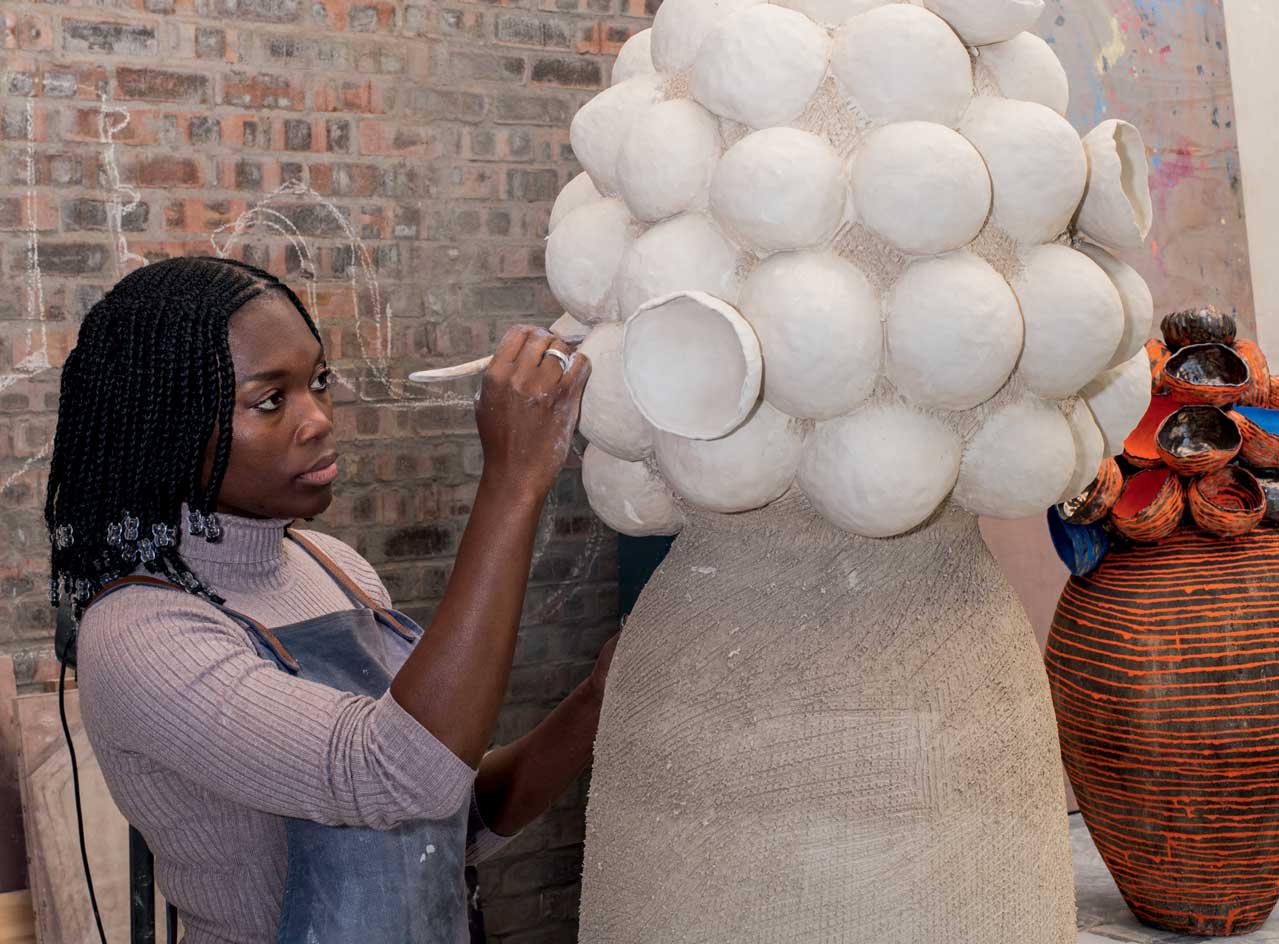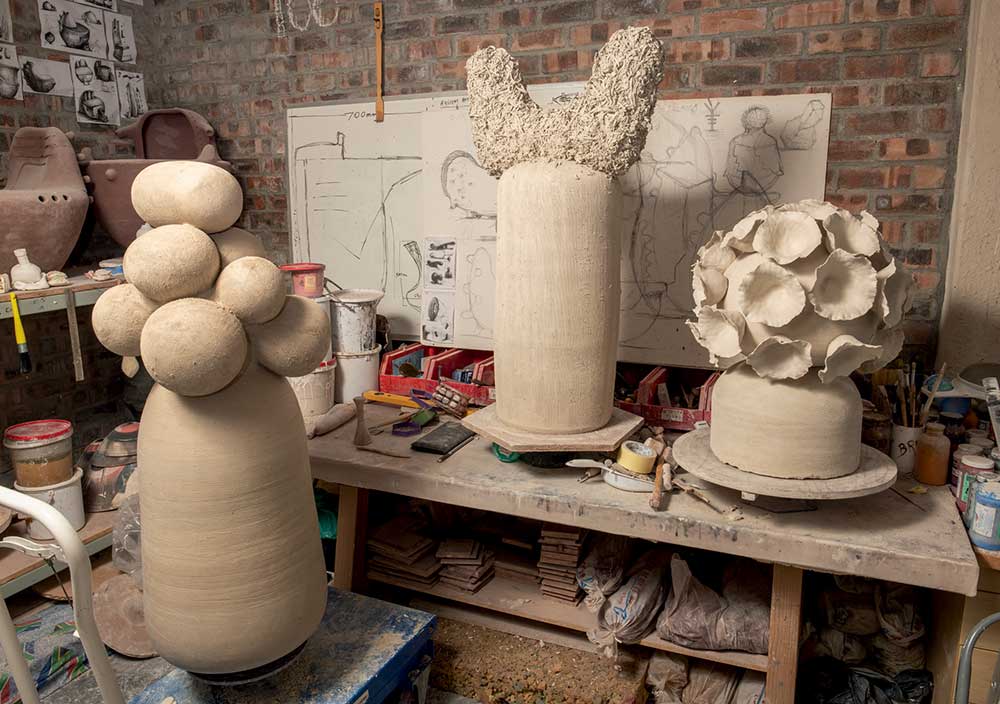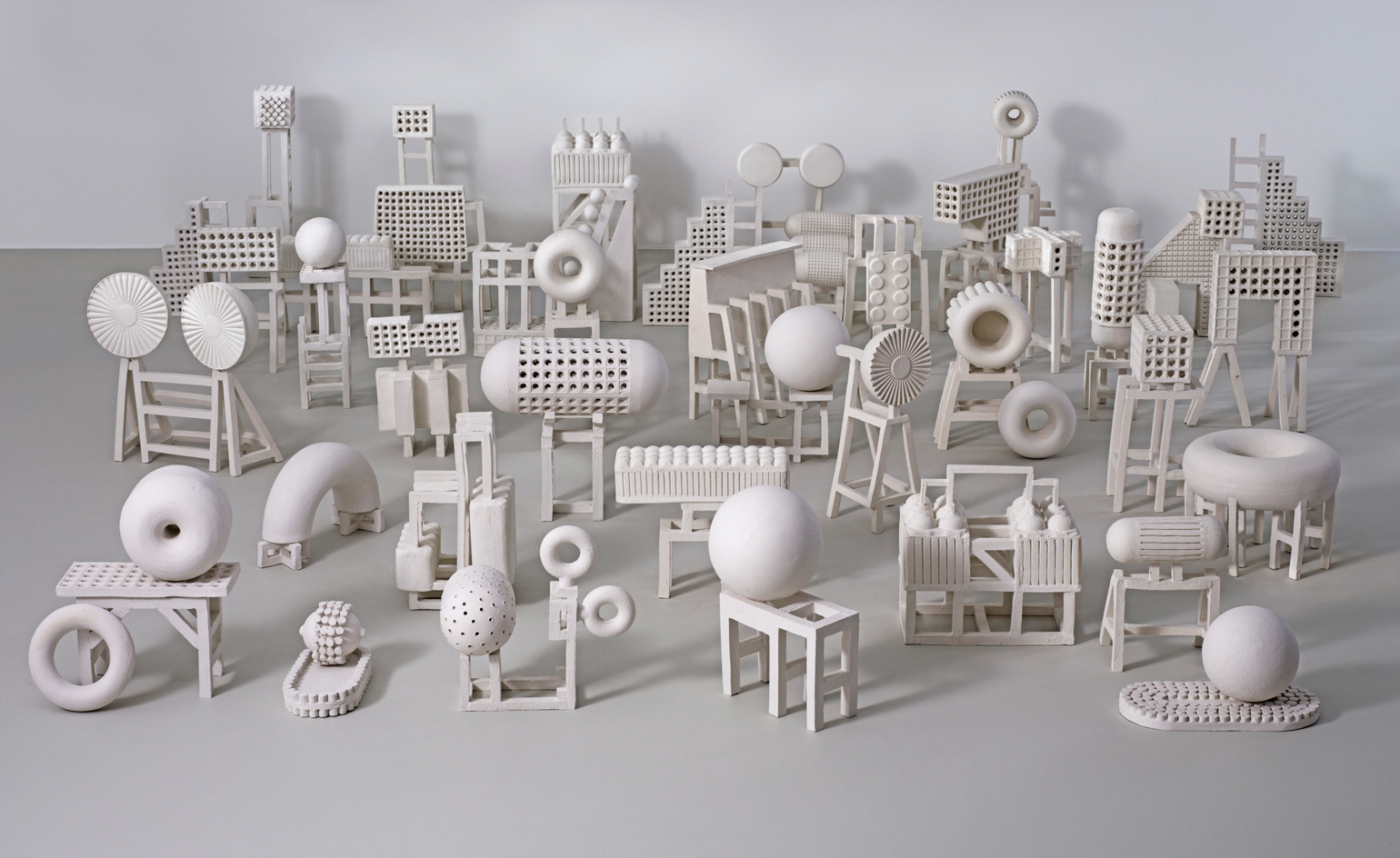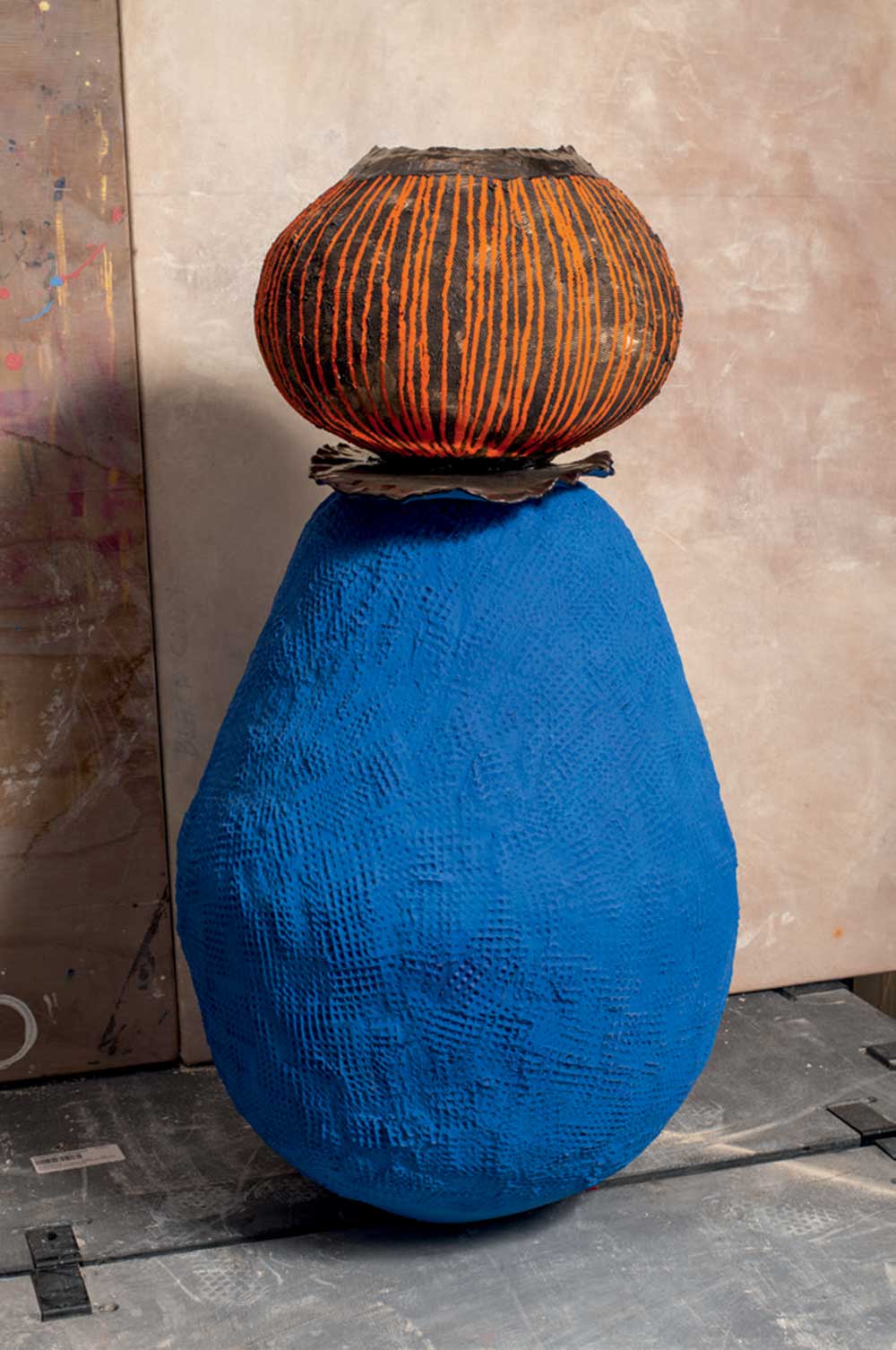Zizipho Poswa’s unique take on ceramic art is inspired by her South African roots
Nico Krijno - Photography

Receive our daily digest of inspiration, escapism and design stories from around the world direct to your inbox.
You are now subscribed
Your newsletter sign-up was successful
Want to add more newsletters?

Daily (Mon-Sun)
Daily Digest
Sign up for global news and reviews, a Wallpaper* take on architecture, design, art & culture, fashion & beauty, travel, tech, watches & jewellery and more.

Monthly, coming soon
The Rundown
A design-minded take on the world of style from Wallpaper* fashion features editor Jack Moss, from global runway shows to insider news and emerging trends.

Monthly, coming soon
The Design File
A closer look at the people and places shaping design, from inspiring interiors to exceptional products, in an expert edit by Wallpaper* global design director Hugo Macdonald.
Cape Town ceramicist Zizipho Poswa received a breathless call from Trevyn and Julian McGowan, of Cape Town gallery Southern Guild, in late 2018. The couple were at Design Miami, where they had just placed two of Poswa’s glazed stoneware pieces with the Los Angeles County Museum of Art (LACMA). As the facts of the transaction settled, so Poswa’s emotions skittered. It had only been a few months since she had debuted her first art pieces, boldly coloured abstract totems that speak about her journey as a Xhosa woman, in a group exhibition in Cape Town.
‘I was still unsure about my work,’ says the Umtata-born ceramicist. ‘I didn’t think my career would get to this level so soon.’ Poswa is not being modest. The two sculptures acquired by LACMA – one is pillar-box red, the other marine blue with gashes of red, and both are titled Ukukhula (‘growth’ in Xhosa)– were only her fifth and sixth personal studio pieces. By this measure, Poswa’s march into the museum world has been brisk, circumventing the usual procedures – extensive production, solo shows, fawning press, patient waiting – that typically preface institutional recognition.
Don’t be fooled by this tale of instant success: Poswa’s ceramic art is the fruit of nearly two decades of commitment to clay as expressive medium and sustainable business. ‘In certain respects, it has been a long journey for Zizi from making functional ceramics to pure art,’ says Trevyn McGowan. ‘When she did eventually turn her hand to art, she made an effortless leap in scale and power.’ The gallerist variously uses words like ‘totemic’, ‘sensual’, ‘confident’ and ‘vibrant’ to characterise the distinctive presence of Poswa’s art pieces.

Work in progress at Powsa's atelier in the Imiso Studio at The Old Biscuit Mill, in Cape Town's Woodstock neighbourhood. Photography: Nico Krijno
McGowan first met Poswa more than a decade ago, while scouting local design for the export market. The search led her to Imiso, a boutique ceramic studio founded in 2006 by five friends – including Poswa and acclaimed ceramicist Andile Dyalvane. The studio, whose name means ‘tomorrow’ in Xhosa, was a leap of faith for Poswa. Unlike Dyalvane, who studied ceramics and was mentored by Chris Silverston of local design studio Potter’s Workshop, Poswa came to the medium with a background in textile design and fashion retail.
The early years of Imiso were tough. ‘We had no infrastructure for anything,’ recalls Poswa. A sympathetic landlord provided the fledgling clay business with a kiln. Three of the founding team fell away, leaving only Poswa and Dyalvane. Both are from the Eastern Cape, the heartland of South Africa’s Xhosa culture. They first met in Port Elizabeth, as students – he dated her best friend. Evidence of their contrasting studio output is displayed in Imiso’s multipurpose space at The Old Biscuit Mill in Woodstock, Cape Town’s new creative hub. Known internationally for his unique terracotta and stoneware pieces that reference his rural upbringing, Dyalvane’s Imiso studio output is more expressive and pop, with motifs inspired by ritual scarification, Picasso, and Cape Town’s harbour. By contrast, Poswa’s delicate utilitarian pinch pots feature bold colour and surface treatments that integrate patterns inspired by traditional Xhosa textiles.
RELATED STORY

To illustrate how she develops her ideas, Poswa plays a clip of a cousin’s Xhosa initiation ceremony in the Eastern Cape, showing a group of women wearing ankle-length umbhaco skirts and moving in jubilant procession. The origin of the stipples and symmetrical lines on her pinch pots becomes clear. ‘I always think in terms of colour, pattern and texture,’ explains Poswa.

Umthwalo 2, one of Powsa's three debut pieces (the others were snapped up by local collectors). Photography: Nico Krijno
This stood her in good stead when, two years ago, Julian McGowan encouraged her to contribute personal work to an exhibition titled ‘Extra Ordinary’. Two unrelated events influenced the tall clay forms she produced. In 2016, Imiso acquired a new kiln capable of firing larger pieces, in the lead up to Dyalvane’s first US solo show at New York’s Friedman Benda, and this provided Poswa with the chance to scale up. More importantly, she was inspired by a visit to the Eastern Cape. ‘It was a time to reflect and revisit childhood memories,’ she says of the trip, which reminded her of the ‘strength and resilience’ of rural Xhosa women. Although notionally abstract, Poswa’s three debut pieces, titled Umthwalo (load), directly evoked the labours of rural women, in particular the bearing of loads on their heads.
For her next series, Ukukhula, Poswa looked inward, at her own professional biography. The works acquired by LACMA, whose holdings also include a terracotta pot by Kenyan-British ceramic artist Magdalene Odundo (see W*240), are an expression of personal growth – ‘about me growing in the industry, growing taller’, she says. Measuring over a metre tall, Ukukhula 1 features protruding jagged triangular forms, while Ukukhula 2 comes with agglomerations of studio shavings added to its surface.
Energised by the response to these recent works, Poswa has been working on a half-dozen new sculptures. The new work references grinding stones and traditional wooden maize stampers, which she noticed while attending her grandmother’s funeral. ‘I am still exploring my background, where I come from,’ she says.
As originally featured in the October 2019 issue of Wallpaper* (W*247) – on newsstands now
INFORMATION
Poswa is part of Southern Guild's debut showing at PAD London, 30 September – 6 October. pad-fairs.com/london; southernguild.co.za; imisoceramics.co.za
Receive our daily digest of inspiration, escapism and design stories from around the world direct to your inbox.
Sean O’Toole is writer, editor and curator based in Cape Town. He has published two books, most recently a 2021 monograph on the expressionist painter Irma Stern, as well as edited three volumes of cultural essays, including 'The Journey: New Positions on African Photography', which received a New York Times critics’ pick for Best Art Books 2021. His exhibition projects include 'Photo book! Photo-book! Photobook!' at A4 Arts Foundation, Cape Town.